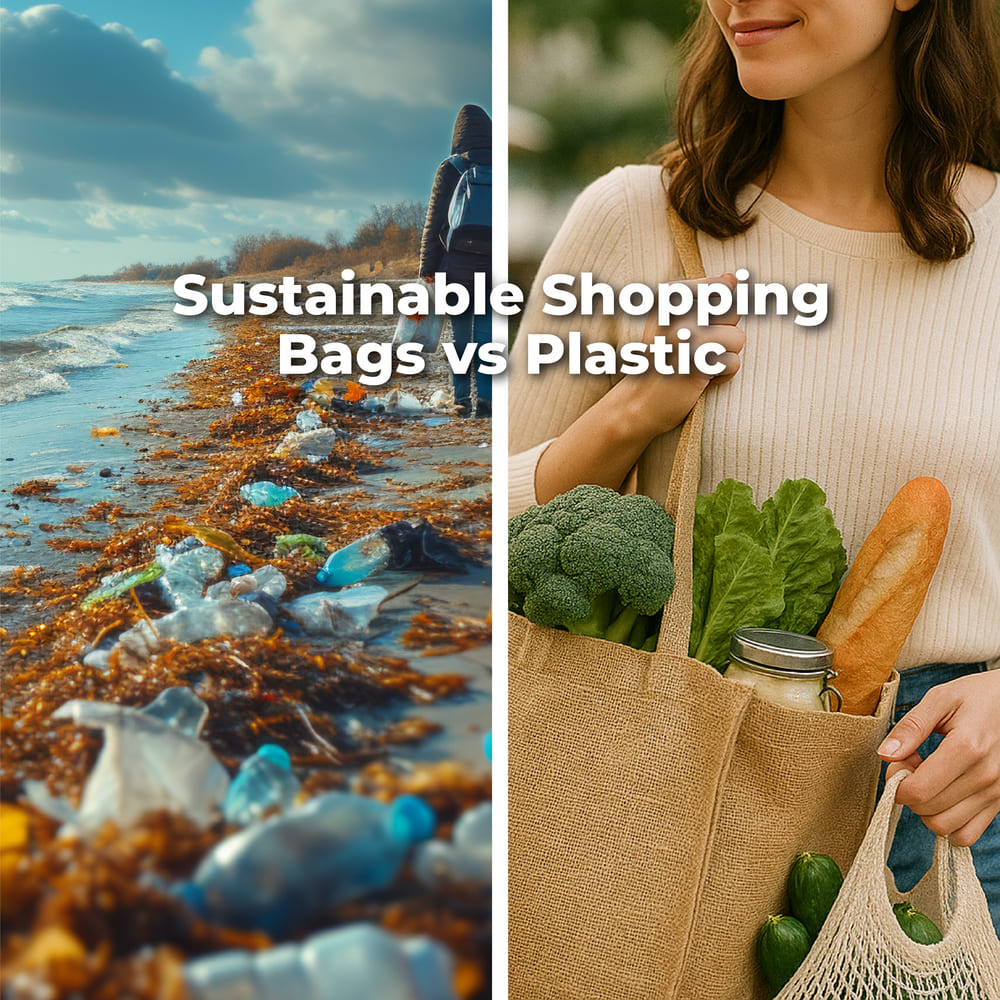In today’s eco-conscious world, sustainability is more than a trend—it’s a necessity. As environmental issues take center stage globally, businesses are increasingly expected to adopt greener practices. One impactful yet simple switch businesses can make is replacing plastic with eco-friendly alternatives like jute bags. Durable, biodegradable, and ethically sourced, jute bags offer compelling environmental benefits that businesses can no longer afford to ignore. In this blog, we explore why jute bags are not just good for the planet, but also a strategic move for responsible brands aiming to lead in sustainability.
Plastic pollution has reached alarming levels, with millions of tons of plastic waste entering landfills and oceans each year. Traditional plastic bags take centuries to decompose, releasing toxic chemicals and microplastics into the environment. Wildlife suffers, oceans are choked, and ecosystems are disrupted. Governments worldwide, including many states in the USA, are banning single-use plastics, making it urgent for businesses to seek sustainable alternatives. Jute bags offer a practical, planet-friendly solution that aligns with the growing movement toward a greener economy.
Jute, often referred to as the "golden fiber," is one of the most sustainable natural fibers available. Here’s why jute stands out environmentally:
Every jute bag used in place of a plastic bag removes hundreds of plastic bags from circulation over its lifetime. Replacing plastic with jute at scale drastically cuts down waste generation and landfill burden.
Unlike plastic bags that persist for centuries, jute bags decompose quickly and safely. They break down naturally without releasing harmful toxins, benefiting soil health and reducing environmental contamination.
Jute grows with natural rainfall and minimal agricultural inputs, unlike cotton, which demands intensive irrigation. Choosing jute helps conserve precious water resources and promotes sustainable farming practices.
Jute plants act as carbon sinks, absorbing more CO₂ than they emit during cultivation. Utilizing jute products therefore helps businesses reduce their overall carbon emissions and environmental impact.
Jute farming supports small-scale farmers and promotes rural livelihoods in developing countries. By sourcing ethically produced jute bags, businesses contribute to social sustainability alongside environmental stewardship.
Modern consumers, particularly Millennials and Gen Z, actively support brands that prioritize the planet. According to Nielsen, 73% of global consumers say they would change their consumption habits to reduce environmental impact. Businesses embracing sustainability not only fulfill a moral imperative but also attract loyal, value-driven customers, improve brand reputation, and stay ahead of regulatory changes. Adopting eco-friendly practices like using jute bags demonstrates leadership, responsibility, and vision—qualities that define the brands of the future.
Modern consumers, particularly Millennials and Gen Z, actively support brands that prioritize the planet. According to Nielsen, 73% of global consumers say they would change their consumption habits to reduce environmental impact. Businesses embracing sustainability not only fulfill a moral imperative but also attract loyal, value-driven customers, improve brand reputation, and stay ahead of regulatory changes. Adopting eco-friendly practices like using jute bags demonstrates leadership, responsibility, and vision—qualities that define the brands of the future.
Leading retailers, grocery chains, and eco-lifestyle brands are switching to jute bags for in-store and promotional use. For instance, boutique shops across California have reported increased customer satisfaction after introducing branded jute shopping bags. Corporate gifting programs using custom jute bags have seen higher engagement and positive feedback compared to traditional plastic or synthetic alternatives. These success stories show that eco-friendly packaging is not only good for the environment but also delivers measurable business value.


Jucofabs stands as a reliable partner for businesses seeking premium, sustainable jute bags. With ethical sourcing, customizable options, and commitment to high-quality manufacturing, Jucofabs helps brands seamlessly integrate eco-friendly practices into their operations. Whether you need wholesale shopping bags, promotional tote bags, or luxury jute gift bags, Jucofabs delivers solutions that align with your brand values and sustainability goals. Discover Jucofabs' eco-solutions here.
Choosing jute bags over plastic is a small action that yields enormous benefits for the planet—and for your brand. Every eco-friendly decision your business makes sends a powerful message to consumers, employees, and the world: that you care, and you’re committed to a better future. By switching to jute bags and promoting sustainable practices, businesses can lead by example, inspire positive change, and build a stronger, greener brand identity.
Under natural conditions, a jute bag decomposes fully within 2–6 months, depending on soil, moisture, and microbial activity.
Yes! Jute bags are exceptionally strong, capable of carrying heavier loads than typical plastic bags, making them ideal for retail, groceries, and promotional purposes.
Absolutely. Companies like Jucofabs offer custom printing options to feature logos, taglines, and brand colors on jute bags, enhancing brand visibility.
Jute uses significantly less water, requires fewer chemical inputs, and matures faster than cotton, making it a more sustainable fiber choice overall.
By adopting biodegradable, ethically produced packaging, companies make measurable progress toward Environmental, Social, and Governance (ESG) benchmarks, attracting investors and eco-conscious consumers alike.